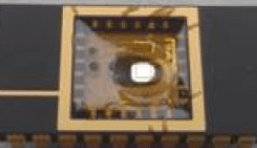Novel Sensor monitors Ethylene Concentration
on

Ethylene is a gas that is produced naturally by fruit to cause fruit to ripen. It is often sprayed in high concentrations (around 1,000 ppm) in warehouses to force fruit to ripen, so it will be ready to eat when it reaches consumers. Accurate, low-cost ethylene sensors would enable better control of this process and allow the distribution sector and retailers to avoid waste. Currently available ethylene detection systems are expensive lab-scale devices and are not suitable for this application.
A possible solution could be the new low-cost single-chip electrochemical sensor for ethylene monitoring that was demonstrated by Imec and the Holst Centre. It is an electrochemical device based on a non-acidic electrolyte that does not evaporate and has a detection limit of 200 to 300 parts per billion (ppb). It can be fabricated on inexpensive substrates such as glass or foil. Recent improvements enable the ethylene sensor to detect 100 ppb step changes in concentrations below 1 ppm, making it suitable for warehouse monitoring applications.


Discussion (0 comments)